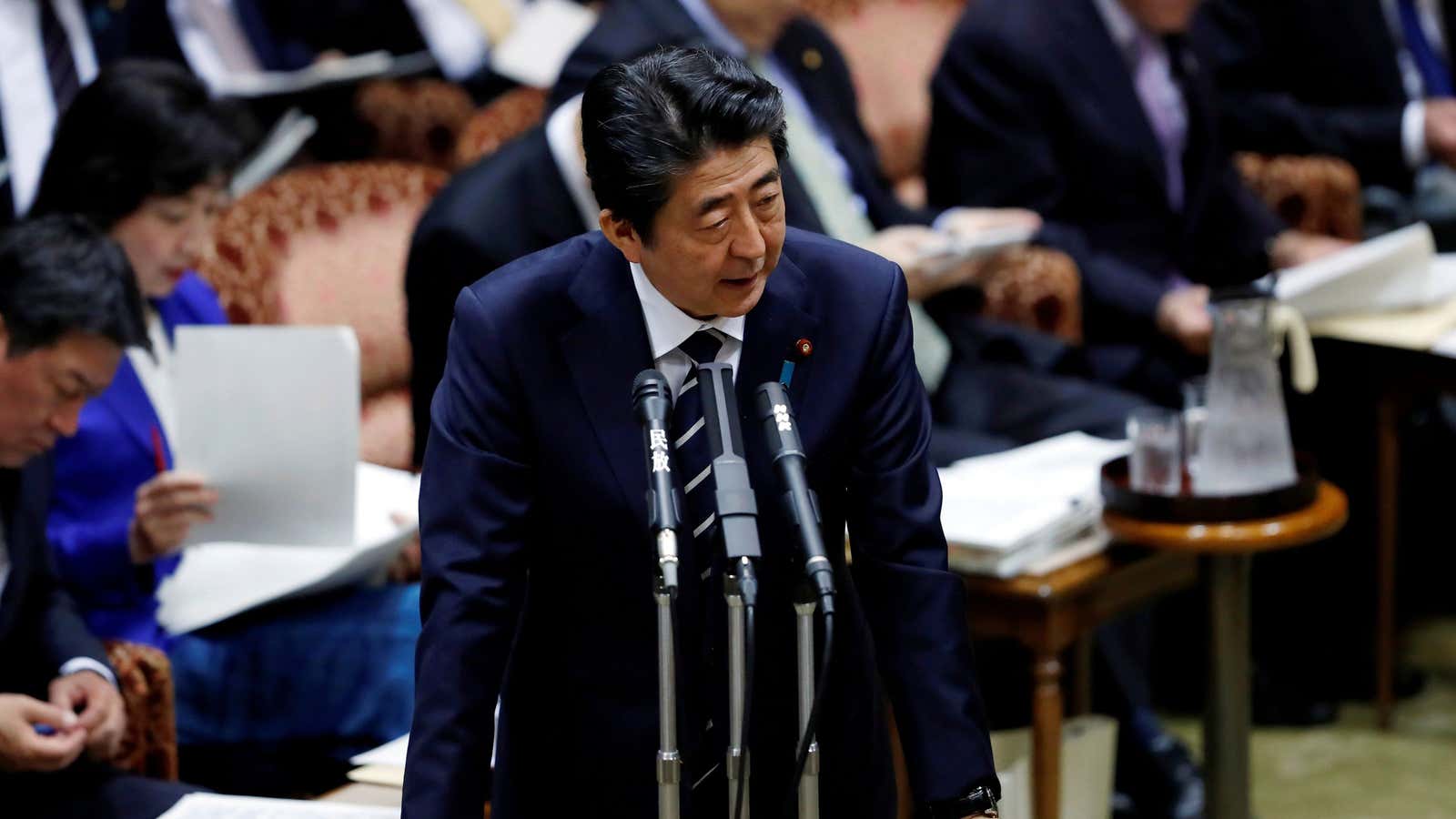That the Trump administration is mired in scandals, investigations, and criticism is well known to most Americans—as highlighted by former FBI director James Comey calling Trump “morally unfit to be president” during an ABC News interview that aired yesterday (April 15).
Less known in the US is that Japanese prime minister Shinzo Abe is deeply mired in scandals of his own. Trump and Abe will hold their third US-Japan summit at Trump’s Mar-a-Lago estate in Florida starting Tuesday (April 17). The leaders will play golf, as they did the previous times they met.
The scion of a political dynasty, Abe hopes to become Japan’s longest-serving prime minister by winning a third term as leader of the ruling Liberal Democratic Party in September. But that goal looks a little more elusive now than it did after Abe’s party comfortably won parliamentary elections late last year.
On Saturday, protestors turned out in full force outside Japan’s parliament with signs reading “Abe quit” and “Abe is over.” Organizers put the number of protestors at about 50,000. Abe’s approval rating now stands at 26.7%, marking the lowest point since he took office in late 2012, according to a Nippon TV survey released yesterday (April 15).
Many who demonstrated suspect Abe of cronyism. One scandal drawing protesters involves the heavily discounted sale of state-owned land to an operator of ultraconservative schools with links to Abe’s wife Akie. Last month the finance ministry admitted it had altered documents—including removing the names of the Abes and the finance minister—before submitting them for parliament’s investigation. Political rivals pounced, saying there was a cover-up and that the Abe cabinet “should resign en masse.” Abe has repeatedly denied any wrongdoing by himself or his wife.
Abe came under more pressure earlier this month over activity logs related to Japan’s 2004-06 military deployment to Iraq. On April 4, defense minister Itsunori Onodera told parliament he’d learned the army had found the records last year, even though his predecessor Tomomi Inada had told parliament they couldn’t be located. “Cover-ups are the basic nature of the Abe cabinet,” charged opposition lawmaker Hiroyuki Konishi.
Yet another scandal plaguing Abe involves suspicions that he helped secure preferential treatment for a friend setting up a veterinary school in a special economic zone.
At least Abe and Trump will have scandals, not just golf, to bond over outside their negotiations, which will focus on North Korea and economic issues. For Abe the fear is that Trump will try to wring trade concessions out of him in exchange for doing the things Abe wants on the security front.
Last month Trump surprised Tokyo by abruptly agreeing to meet with North Korean dictator Kim Jong-un, whose regime has been antagonistic toward Japan. If Trump indeed meets Kim, Abe wants him to seek the elimination of all North Korean missiles that could reach Japan, not just long-range ones that can hit the US, and to bring up Japanese citizens abducted by North Korea decades ago.
But Trump is looking for victories, too, especially ahead of the November mid-term elections. He could press Abe for market access and monetary and currency policies more favorable to the US. He might use the steel and aluminum tariffs he recently imposed—and a possible exemptions to them—for leverage. Also, Trump recently suggested the US might join the Trans Pacific Partnership, which he pulled out of it early last year while it was being negotiated. Japan is opposed to any big makeover of the trade pact, which the remaining countries signed last month without the US, but Trump could pressure Abe there, too.
It was concerns about North Korea that prompted Abe to seek this week’s summit, and he and Trump will likely agree to reject any phased denuclearization by Pyongyang. But as he returns to Mar-a-Lago, that is but one of his many problems.
